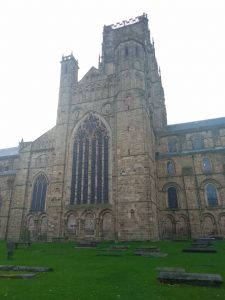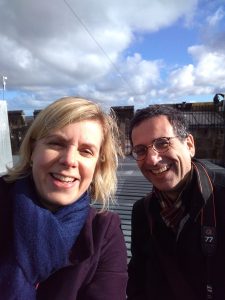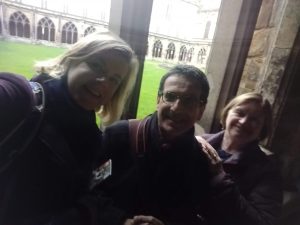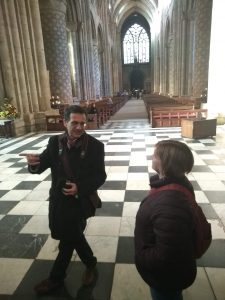CILIP Information Literacy Group Chair Jane Secker reports on her talk with Advocacy & Outreach Officer Stéphane Goldstein at the RSA (Royal Society for the encouragement of Arts, Manufactures and Commerce), event on “Critical thinking in an age of disinformation and fake news’.
On 28th October, Stéphane Goldstein and I were invited to speak at an RSA regional event in Durham, taking place just outside the city at Usher College. We were invited to give the talk by Moira Bent, a long-time friend and former librarian from Newcastle University (now retired) who is member of the Durham RSA network. Moira is also an RSA Fellow and responsible for nominating me as a Fellow, and subsequently me nominating Stéphane to be one too! If you are not familiar with the RSA, they are the Royal Society of Arts, founded in 1754 and based just off the Strand on John Adams Street in the rather lovely RSA House.
place just outside the city at Usher College. We were invited to give the talk by Moira Bent, a long-time friend and former librarian from Newcastle University (now retired) who is member of the Durham RSA network. Moira is also an RSA Fellow and responsible for nominating me as a Fellow, and subsequently me nominating Stéphane to be one too! If you are not familiar with the RSA, they are the Royal Society of Arts, founded in 1754 and based just off the Strand on John Adams Street in the rather lovely RSA House.
 The title of the talk was “Critical thinking in the age of disinformation and fake news” and we were delighted to have an engaged audience from entirely outside the library sector. Our slides are online. During the discussion that followed our presentation, we had a mix of people interested in the subject, from teachers, retired teachers to a careers advisor and ophthalmologist! We started with some definitions of what we mean by critical thinking and specifically what is disinformation. From the outset, Stéphane wanted to share his dislike of the term ‘fake news’ with the group and admitted we’d only put it in the title of the talk because it was so topical! We introduced ourselves briefly as well to explain our interest in the subject and the work of the Information Literacy Group.
The title of the talk was “Critical thinking in the age of disinformation and fake news” and we were delighted to have an engaged audience from entirely outside the library sector. Our slides are online. During the discussion that followed our presentation, we had a mix of people interested in the subject, from teachers, retired teachers to a careers advisor and ophthalmologist! We started with some definitions of what we mean by critical thinking and specifically what is disinformation. From the outset, Stéphane wanted to share his dislike of the term ‘fake news’ with the group and admitted we’d only put it in the title of the talk because it was so topical! We introduced ourselves briefly as well to explain our interest in the subject and the work of the Information Literacy Group.
We spoke about the premise behind our subject: the deluge of information with which we are all presented, meaning that it is relatively easy to access huge amount of information, but more than ever we need the ability to be discerning about it. This is coupled with concerns about the rise of disinformation and misinformation and the use of our personal data by states and large corporations, making for a toxic mix. I referenced the work of Safiya Noble in her book ‘Algorithms of Oppression’ and also Jamie Bartlett’s rather bleak view of the future of democracy in the age of the internet, in his book ’the People verses Tech’. One thing we stressed was that the problem is complex and the solutions need to be correspondingly multi-facetted and context-driven. Simply to say that information literacy is the answer was not our message. However we highlighted the role that librarians and information professionals can play in formal and informal learning.
Stéphane gave an overview of selected policy responses to the problem, including a number of recent reports into the topic such as the House of Commons Select Committee report on Disinformation and Fake News; The Cairncross Review, commissioned by the government to look at the challenges facing quality journalism; the Online Harms White Paper and also work by the European Commission’s high level expert group on fake news and disinformation.
We had an opportunity to share the CILIP Information Definition with the group and the need for information literacy in the curriculum at both school and higher education levels. During the discussions we learnt about a few regional initiatives in the north east aimed at developing critical thinking skills in young people; we agreed that such initiatives were real challenge, and that education alone was not the answer. We discussed the idea of a public awareness campaign and while we didn’t have any concrete answers, it’s clear that there are some key overlaps with our work and some of the RSA programmes that have been launched recently, particularly their own disinformation project. We hope this might be the start of a fruitful collaboration with RSA and look forward to discussing further ideas with them and some of the contacts we made at the event.
 The trip to Durham was not all work and Stéphane and I were delighted to be hosted by Moira, who has lived in Durham most of her life and now volunteers as a ‘Durham pointer’ providing tourist information in the city. The highlight is of course the fabulous Norman cathedral whose main tower we climbed the morning after our talk. We also checked out a number of fine tea shops and eating establishments and the city looked glorious in the autumn sunlight.
The trip to Durham was not all work and Stéphane and I were delighted to be hosted by Moira, who has lived in Durham most of her life and now volunteers as a ‘Durham pointer’ providing tourist information in the city. The highlight is of course the fabulous Norman cathedral whose main tower we climbed the morning after our talk. We also checked out a number of fine tea shops and eating establishments and the city looked glorious in the autumn sunlight.
 Stéphane snapped many wonderful photos during our visit and kindly escorted me down the cathedral tower’s winding medieval staircase after a mild attack of vertigo! Thank you to Moira for suggesting this event and being a super host and thanks to the RSA Durham network for the opportunity to visit your beautiful city.
Stéphane snapped many wonderful photos during our visit and kindly escorted me down the cathedral tower’s winding medieval staircase after a mild attack of vertigo! Thank you to Moira for suggesting this event and being a super host and thanks to the RSA Durham network for the opportunity to visit your beautiful city.



